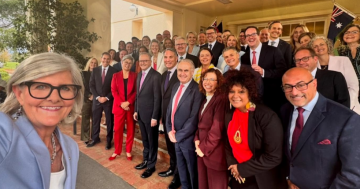
The ability to adjust your language consciously and compassionately to the particular audience you are addressing is a core leadership skill. Photo: vivcoach.
Michelle Gibbings urges leaders to use words with care as language is rapidly evolving and phrases that were once considered clever risk sounding dated or even offensive.
In a world saturated with soundbites, pings, and always-on communication, it’s easy to assume that the more you talk, the more influence you will have.
Yet in leadership, impact isn’t measured by how much you say, but rather in the meaning behind your words, the timing of their delivery, and the discipline to know when not to speak at all.
Language is never neutral. It evolves with society, carrying shifts in cultural values, power dynamics, and social expectations. What was once colloquial or clever can, over time, become problematic or passé.
As Jane Sullivan recently explored in The Age, expressions such as ”dog act” are not just unfair to dogs. Phrases that may once have felt harmless now risk sounding offensive or outdated.
Her piece serves as a reminder that language isn’t just about words. It’s about what those words represent in changing social contexts.
Sometimes we use phrases without knowing their origins. We pick up a phrase and use it often without challenging whether it is still fit for purpose.
Examples are ‘’carrying the can’’ and ‘red tape’. While the former has murky military roots, the latter dates back to 16th-century administrative practices. Both are still used to describe modern-day responsibility and bureaucracy.
These shifts are more than linguistic curiosities. They matter because as language changes, so does what is considered respectful, persuasive, and influential in a professional context.
Another layer to consider in this challenge is that we can store and process language differently.
Researcher Nichol Castro, who specialises in communicative disorders and sciences, says we each hold a ”mental dictionary”, a personalised web of associations built through experience, culture, and emotion. As a result, no two people will interpret a word or phrase in precisely the same way.
For leaders, this is crucial. You may think you’re being clear, but your message may not land as expected.
The ability to adjust your language consciously and compassionately is a core leadership skill. You want to calibrate your language to meet your audience where they are at, which requires deliberate care, attention, and connection.
The English language contains more than 12,000 commonly used words, with most day-to-day communication relying on a much smaller subset.
Linguists suggest that you only need around 4000 English words to communicate effectively — an excellent reminder that it’s not about how much you say, but how deliberately you choose the words you use.
This choice becomes even more apparent in workplace interactions. A study found that when people talked about work-related achievements, they were perceived as less supportive and less engaging. Conversations that touched on personal or emotional topics were more likely to result in ongoing connections.
This research offers a caution for leaders. If you focus only on tasks, you risk weakening relationships. Emotional tone and personalisation matter. In leadership, it is not just what you talk about, but how you make people feel when you do.
While words matter, so too do tempo and silence. Silence plays a decisive role in how the message is conveyed, and consequently, your level of impact.
In high-stakes meetings or challenging conversations, silence can feel uncomfortable. Many people rush to fill it, but when used with skill, silence becomes a strategic tool. It allows space for reflection. It gives weight to what has just been said. It allows time for others to speak.
Leaders who understand this do not fear a pause. They know when to speak and when to wait.
In negotiation, silence can draw out more information and create constructive tension. In conversation, it can signal attentiveness, calm, and confidence.
However, silence is not always helpful. It becomes harmful when it is used to withdraw or punish. The ”silent treatment” may seem passive, but it erodes trust and blocks communication.
Even more damaging is imposed silence, when people feel unable to speak up out of fear, exclusion, or futility.
When silence becomes avoidance rather than intention, it costs relationships, innovation, and psychological safety.
Most of us engage in forms of self-talk — that inner auditory voice where we talk to ourselves. The words we use affect our stress levels, focus, and confidence.
The same applies externally. Leaders shape the tone and tenor of a team’s self-talk through their choice of language, their willingness to listen, and their comfort with silence.
So, as you think about how you lead and influence, remember leadership is not about having the loudest voice in the room. It’s not about speaking more, but about speaking better. It is about talking with clarity, empathy, and intent, and listening with equal consideration to the words you use.
Success requires you to be conscious of your tone, context, and timing of what you say, and equally mindful of when to stop talking and let the silence do the work.
It requires acceptance that, at times, silence is not the absence of leadership, but a deeper expression of it.
Words matter. So does silence. Use both with care.
Michelle Gibbings is a Melbourne-based workplace expert, and an award-winning author. She’s on a mission to help leaders, teams and organisations create successful workplaces — where people thrive and progress is accelerated. She can be contacted at [email protected]. This article first appeared at https://www.changemeridian.com.au/latest-news/.











